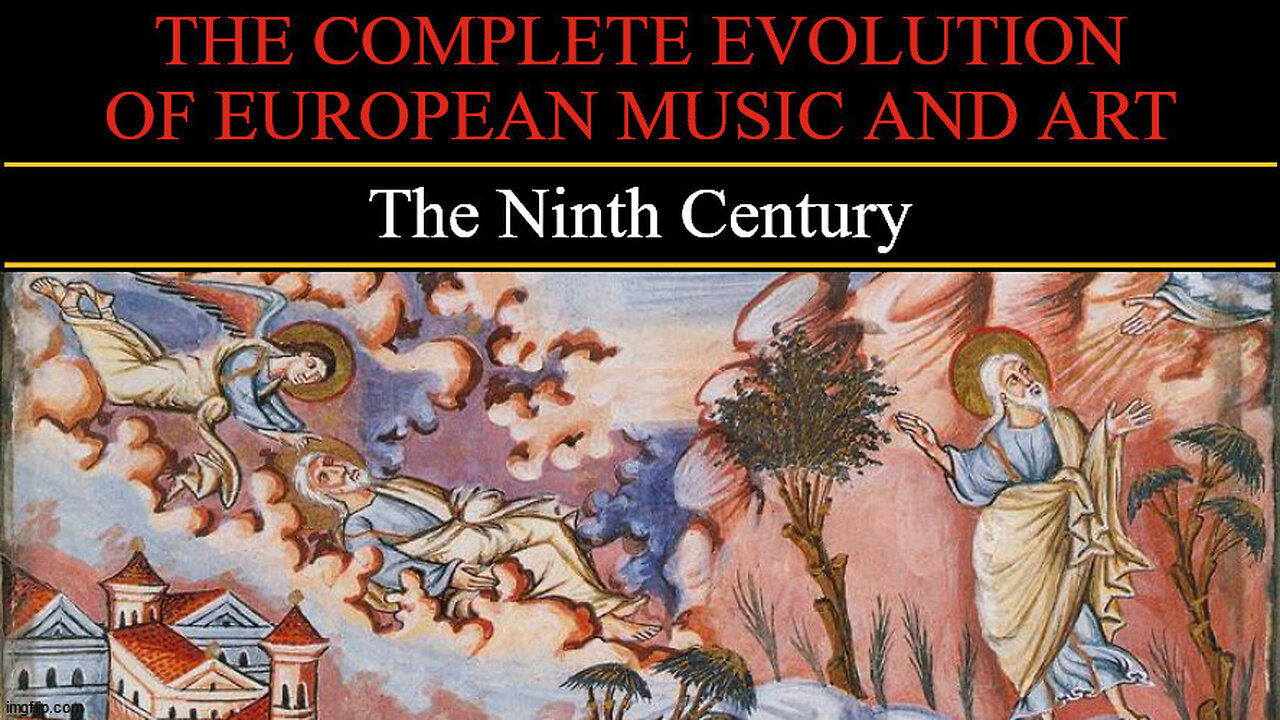Premium Only Content

Timeline of European Art and Music - The Ninth Century
Music
0:00 - 814 - Written by a monk from Bobbio (in Italy)
Planctus de Obitu Karoli, or "Lament on the Death of Charlemagne"
Charlemagne or Charles the Great, a member of the Carolingian dynasty, was King of the Franks from 768, King of the Lombards from 774, and the first Holy Roman Emperor from 800. On January 28, 814, he died of pleurisy, a lung disease.
This song was written shortly after.
9:30 - Early to mid 800s - Rabanus Maurus (German) - Veni Creator Spiritus (Come, Creator Spirit)
Translated and paraphrased into several languages, and adapted into many musical forms, often as a hymn for Pentecost or for other occasions that focus on the Holy Spirit.
12:33 - Circa 800s - Unknown - Audi Tellus, Audi Magni Maris Limbus
The first verse translated reads -
"Hear, earth;
hear the edge of the great sea;
Listen man;
hear all that liveth under the sun:
It will come, it is near
day of supreme wrath
unseen day
bitter day
which alone will flee
the sun will blush
the moon will change
the day will turn black
the stars will fall upon the earth."
19:49 - Circa early 900s - Unknown (French) - Incipit Planctus Karoli (Karoli's Lament Begins)
The first line (A solis ortu...) is drawn from a fifth-century hymn of Caelius Sedulius. As the Sedulian hymn was sung at Christmas time, the sorrowful Planctus presents a contrast with the joy typically associated with its opening. The poet expands upon his personal grief at the death of his emperor—and benefactor of Bobbio—by asking all the regions of Earth to mourn with him, and using the tears of Saint Columbanus, founder of Bobbio, as a symbol of the monastery's grief.
25:23 - 900s - Otfrid von Weißenburg (German)
Thes abet er ubar woroltring
A song about the last day of judgement before God. A translation of the first verse reads as follows.
"For the entire world a judgement day has been set,
before a powerful court, and we must fear it. I say
this loudly: there will be no one who can avoid
appearing before this court!"
32:55 - Circa 900s - Unknown (German) - Muspilli (a fragment from text)
Muspilli is an Old High German poem known in incomplete form (103 lines) from a ninth-century Bavarian manuscript. Its subject is the fate of the soul immediately after death and at the Last Judgment.
40:52 - Circa prior 884 - Notker Balbulus (Swiss)
Quid tu, virgo (Why thou, virgin)
The first verse roughly translated reads -
"Why do you, virgin, Mother, weep, beautiful Rachel, Jacob pleases? Let the wisdom of his old sister help him Wipe, mother, How do the wrinkles of your cheeks suit you? Alas, alas, alas; When I was bereaved, who alone would take care, Who would not surrender to the enemies the narrow borders which Jacob had acquired for me, and who would benefit from the stupid brothers, many of whom I,unfortunately, brought out. Is he to be wept, who possessed the heavenly kingdom? and who helps the poor brothers with frequent prayers to God?"
-
 1:44:25
1:44:25
The Quartering
3 hours agoTrump Impeachment, Democrat Insurrection, Massive Scandal At Politico & DC Crash Update!
48.7K34 -
 LIVE
LIVE
Dr Disrespect
4 hours ago🔴LIVE - DR DISRESPECT - KINGDOM COME: DELIVERANCE 2 - FIRST IMPRESSION
3,609 watching -
 37:54
37:54
CryptoWendyO
2 hours ago $0.03 earnedBEST DAY IN CRYPTO HISTORY
301 -
 LIVE
LIVE
Film Threat
7 hours agoVERSUS: FANTASTIC FOUR + CAPTAIN AMERICA + QUENTIN TARANTINO'S EPIC RANT | Film Threat Versus
66 watching -
 9:06
9:06
CryptoWrld
11 hours ago $0.82 earnedHow Nonprofits Use Blockchain Tech
8.87K2 -
 16:38
16:38
SLS - Street League Skateboarding
14 days agoRayssa Leal's Most Clutch SLS Wins Ever! 🥶🏆
73.8K4 -
 1:06:29
1:06:29
Russell Brand
5 hours agoGaza Takeover? Trump’s Bold Plan Sparks Global Outrage – SF532
113K248 -
 1:57:32
1:57:32
The Charlie Kirk Show
4 hours agoGaza Thoughts + DOGE The Destroyer | Sen. Schmitt, Benz | 2.5.2025
124K28 -
 1:21:08
1:21:08
Simply Bitcoin
4 hours ago $1.30 earnedNEW REPORT: Bitcoin ETF Insider Doubles Down on UNTHINKABLE 2030 prediction! | EP 1176
33.5K1 -
 2:50:42
2:50:42
The Dana Show with Dana Loesch
4 hours agoTRUMP PLANS TO TAKE OVER GAZA | The Dana Show LIVE On Rumble!
33.2K8